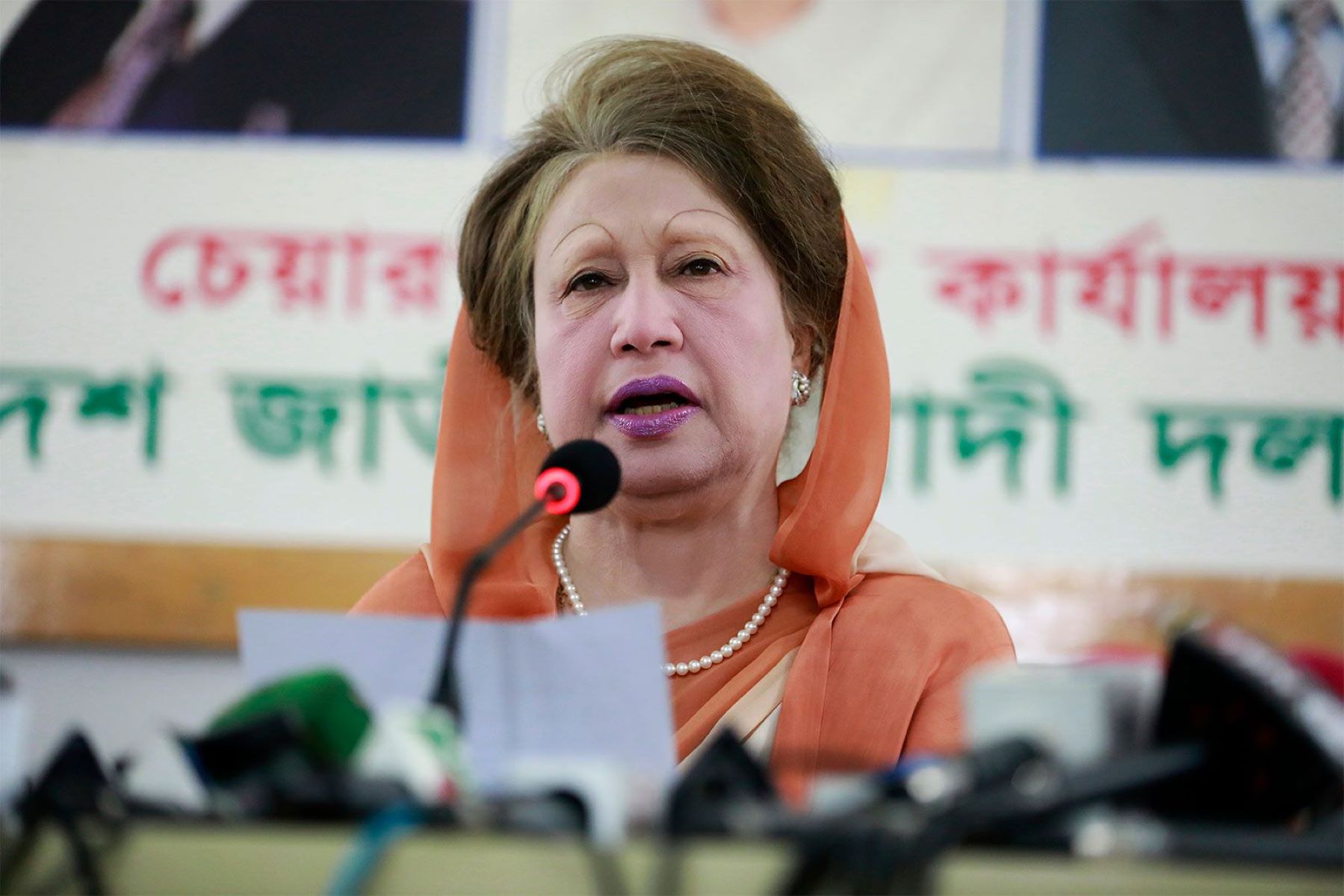
Khaleda Zia, a prominent political figure in Bangladesh, has captivated the world with her fascinating life and career. As the former Prime Minister of Bangladesh, Khaleda Zia has left an indelible mark on her country’s political landscape. With a career spanning several decades, she has been a leading figure in the Bangladesh Nationalist Party (BNP) and has played a crucial role in shaping the country’s political destiny.
In this article, we delve into the life of Khaleda Zia and uncover 17 intriguing facts that showcase her influence, achievements, and controversies. From her humble beginnings to her rise as the first female Prime Minister of Bangladesh, Khaleda Zia’s journey is nothing short of remarkable. Join us as we explore the various facets of her life and gain a deeper understanding of this enigmatic political figure.
Key Takeaways:
- Khaleda Zia, the first female Prime Minister of Bangladesh, played a crucial role in shaping the country’s political landscape and advocating for women’s rights, earning international recognition and praise.
- Despite facing challenges and controversies, Khaleda Zia remains a prominent and influential figure in Bangladeshi politics, with a dedicated following and a legacy that will be remembered for years to come.
Khaleda Zia served as the Prime Minister of Bangladesh.
Khaleda Zia, a prominent Bangladeshi politician, held the position of Prime Minister for two non-consecutive terms, from 1991-1996 and 2001-Her leadership and political career have left a lasting impact on the country’s political landscape.
She is the first female Prime Minister of Bangladesh.
Khaleda Zia made history by becoming the first woman to hold the position of Prime Minister in Bangladesh. Her appointment marked a significant milestone for women’s representation and empowerment in the country’s political system.
Khaleda Zia is the chairperson of the Bangladesh Nationalist Party (BNP).
As the chairperson of the Bangladesh Nationalist Party (BNP), Khaleda Zia played a pivotal role in shaping the party’s policies and political strategies. Her strong leadership and influence have made the BNP one of the major political forces in Bangladesh.
She played a key role in the country’s struggle for independence.
Khaleda Zia actively participated in the Bangladesh liberation movement during the 1971 War of Independence against Pakistan. Her dedication and commitment to the cause earned her immense respect and admiration from the people of Bangladesh.
Khaleda Zia was born on August 15, 1945.
She was born on August 15, 1945, in Dinajpur, British India (now Bangladesh). Her birthdate significantly coincides with the day India gained independence from British rule, making it a symbol of national significance.
She was married to Ziaur Rahman, a former President of Bangladesh.
Khaleda Zia’s marriage to Ziaur Rahman, a renowned military officer who later became the President of Bangladesh, shaped her political career. Following Ziaur Rahman’s assassination, Khaleda Zia stepped into the forefront of politics
Khaleda Zia has faced several legal battles throughout her career.
During her career, Khaleda Zia has faced numerous legal challenges and allegations, including corruption charges. These controversies have had a significant impact on her political image and standing.
She has been placed under house arrest multiple times.
Khaleda Zia has experienced periods of house arrest as a result of political turmoil and unrest in Bangladesh. These incidents have often sparked widespread public protests and debates over human rights and political freedom.
She has been a prominent advocate for women’s rights in Bangladesh.
Khaleda Zia has been an influential figure in advocating for women’s rights and empowerment in Bangladesh. Her commitment to promoting gender equality and addressing issues such as violence against women has earned her recognition both domestically and internationally.
Khaleda Zia has been a vocal critic of the ruling government.
As a prominent opposition leader, Khaleda Zia has been a vocal critic of the ruling government and its policies. Her strong stance and outspoken nature have made her a key figure in shaping public discourse and political debates in Bangladesh.
She has received numerous international awards and accolades.
Khaleda Zia has been recognized and honored internationally for her contributions to politics and social causes. She has received awards such as the Mother Teresa Award for Social Justice and the UNESCO Peace Tree Award.
Khaleda Zia’s sons have also been involved in politics.
Her two sons, Tarique Rahman and Arafat Rahman, have followed in their mother’s footsteps and have been actively involved in Bangladeshi politics. They have held important positions within the Bangladesh Nationalist Party (BNP).
She has been a participant in various international forums and summits.
Khaleda Zia has represented Bangladesh on the global stage, attending international forums and summits. Her international engagements have allowed her to foster diplomatic relations and address crucial issues of national and global concern.
She has been praised for her strong leadership skills.
Khaleda Zia is widely regarded as a charismatic and influential leader. Her ability to navigate complex political situations and make tough decisions has earned her praise and admiration from her supporters.
Khaleda Zia has a large and dedicated political following.
Throughout her career, Khaleda Zia has garnered a significant support base and has a loyal following of supporters. Her ability to connect with people on a grassroots level has played a crucial role in her political success.
She has been both celebrated and criticized for her political ideologies.
Khaleda Zia’s political ideologies and policies have polarized public opinion. While some admire her for her strong stance on issues, others have criticized her for alleged corruption and divisive tactics.
Khaleda Zia remains a prominent figure in Bangladeshi politics.
Despite facing challenges and controversies, Khaleda Zia continues to be an influential and key figure in Bangladeshi politics. Her legacy and impact on the political landscape will be remembered for years to come.
Conclusion
In conclusion, Khaleda Zia is a fascinating figure who has left an indelible mark on the political landscape of Bangladesh. From her role as the first female Prime Minister of the country to her controversial tenure as the leader of the Bangladesh Nationalist Party (BNP), Khaleda Zia has captivated the attention of the nation.Through these 17 intriguing facts, we have gained insight into the life and career of Khaleda Zia. We have explored her early life, political journey, and contributions to Bangladesh’s development. We have also delved into the controversies surrounding her leadership, including her legal battles and imprisonment.Khaleda Zia is a complex and influential figure in Bangladesh’s history, and her impact continues to be felt today. Whether admired or criticized, she has undeniably played a significant role in shaping the country’s political landscape. Understanding her story provides valuable insights into the challenges and triumphs of leadership in Bangladesh.
FAQs
1. Who is Khaleda Zia?
Khaleda Zia is a prominent political figure in Bangladesh. She served as the Prime Minister of Bangladesh from 1991 to 1996 and again from 2001 to 2006.
2. Which political party does Khaleda Zia belong to?
Khaleda Zia is a member of the Bangladesh Nationalist Party (BNP), one of the major political parties in Bangladesh.
3. What are some notable achievements of Khaleda Zia?
Khaleda Zia is credited with improving the country’s economy, infrastructure, and social welfare programs during her tenure as Prime Minister. She implemented various development projects and initiatives.
4. What are some controversies surrounding Khaleda Zia?
Khaleda Zia has faced several legal battles, including corruption charges and allegations of misuse of power. She has also been involved in political conflicts and clashes with her opponents.
5. Has Khaleda Zia faced any legal consequences?
Yes, Khaleda Zia has been convicted and imprisoned for corruption charges. However, her supporters argue that the charges were politically motivated.
6. What is Khaleda Zia’s current political status?
Khaleda Zia is currently inactive in politics due to her imprisonment. However, she still remains a prominent figure within her party and has a significant influence on its decisions.
7. How has Khaleda Zia impacted Bangladesh’s political landscape?
Khaleda Zia has played a significant role in shaping Bangladesh’s political landscape, being one of the key figures in the political scene for many years. Her leadership and policies have had a lasting impact on the country.
8. Is Khaleda Zia popular among the people of Bangladesh?
Khaleda Zia has a dedicated support base, particularly within her party. However, her popularity has also fluctuated over the years and varies among different segments of society.
9. What is Khaleda Zia’s family background?
Khaleda Zia was born into a prominent political family. Her late husband, Ziaur Rahman, was a former President of Bangladesh.
10. What is Khaleda Zia’s current condition?
Due to health issues, Khaleda Zia is currently receiving medical treatment in Bangladesh. Her health has been a subject of concern and debate among her supporters and critics.
Khaleda Zia's fascinating life story captivates readers, leaving them eager to explore more intriguing tales of remarkable individuals. Dive into the enigmatic world of Sheikh Hasina, Bangladesh's current Prime Minister, and uncover 18 unbelievable facts about her journey. Discover the secrets behind BNP Paribas, one of Europe's largest banks, through 16 puzzling revelations. Lastly, embark on a captivating adventure with Norodom Sihanouk, Cambodia's former king and prominent political figure, as you unravel 14 mesmerizing facts about his life and legacy.
Was this page helpful?
Our commitment to delivering trustworthy and engaging content is at the heart of what we do. Each fact on our site is contributed by real users like you, bringing a wealth of diverse insights and information. To ensure the highest standards of accuracy and reliability, our dedicated editors meticulously review each submission. This process guarantees that the facts we share are not only fascinating but also credible. Trust in our commitment to quality and authenticity as you explore and learn with us.


